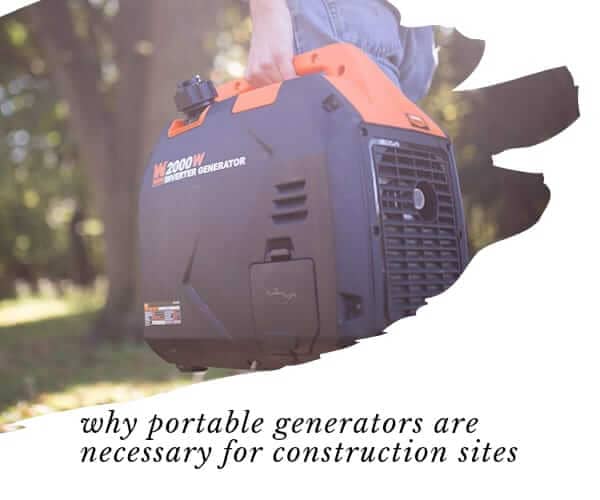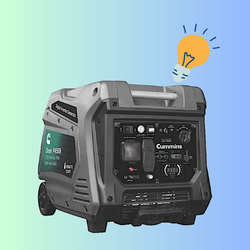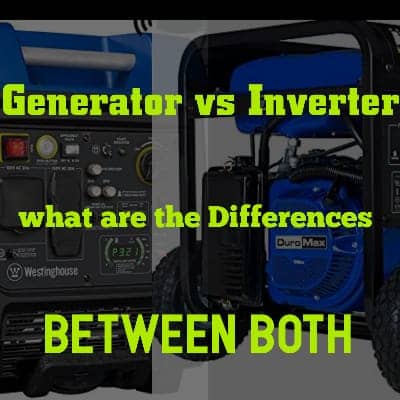
Construction sites are bustling with activity, with various types of equipment and tools being used to complete the job. However, power outages can happen at any time, making it difficult to keep the construction site running smoothly. Portable generators can provide a reliable and efficient source of power, making them essential for construction sites. In this blog post, we will explore why portable generators are necessary for construction sites and how they can improve productivity.
What are Portable Generators?
Portable generators are compact devices that provide electrical power to a variety of appliances and tools. They typically run on gasoline, diesel, or propane, and can be easily transported to different locations. Portable generators are commonly used in situations where a power source is not readily available, such as on construction sites.
Why are Portable Generators Essential for Construction Sites?
Reliable Source of Power
Construction sites require a consistent and reliable source of power to operate heavy machinery and tools, maintain lighting, and run various other electrical systems. In the absence of a reliable power supply from the grid, portable generators can serve as an alternative power source for construction sites. These generators are designed to provide a dependable source of electricity that can keep the construction site running smoothly, even during power outages.
A portable generator is essentially an engine-powered device that converts fuel into electricity. The generator can be powered by gasoline, diesel, or propane, and it can generate power ranging from a few kilowatts to several megawatts, depending on the specific application.
One of the key advantages of portable generators is their mobility. They can be moved easily around the construction site and can be set up in minutes to provide power where it is needed most. Additionally, portable generators can be used in remote locations or areas where grid power is not readily available.
Portable generators are designed to be reliable and durable, making them ideal for use in harsh and challenging construction environments. They are equipped with features such as automatic voltage regulation and overload protection, which help to ensure a steady and consistent supply of power.
In addition, many portable generators are designed with weather-resistant enclosures, which can help to protect the generator from damage due to rain, snow, or other environmental factors.
When selecting a portable generator for a construction site, it is important to consider the specific power requirements of the equipment and tools that will be used. The generator should be capable of providing enough power to run all of the equipment and tools at the same time without overloading. It is also important to consider the fuel efficiency of the generator, as well as its noise level, ease of use, and maintenance requirements.
Increases Productivity
A reliable power source is crucial to the productivity of a construction site. When workers experience downtime due to a lack of power, it can lead to delays and decreased productivity, which can ultimately impact the overall success of the project. Portable generators can provide a reliable power source on demand, which can help to keep the construction site running smoothly and increase productivity.
With a portable generator, construction workers can have access to a dependable source of power, which can keep equipment and tools running without interruption. This can help to minimize downtime and prevent delays in the construction process. Additionally, having access to a reliable power source can help workers complete their tasks more efficiently, which can increase productivity and ultimately help to save time and money.
Portable generators can also help to prevent disruptions due to power outages caused by inclement weather or other unforeseen circumstances. In the event of a power outage, a portable generator can provide backup power, allowing workers to continue working without interruption. This can help to minimize the impact of power outages on productivity and ensure that the project remains on track.
Another advantage of portable generators is their ability to power multiple tools and equipment simultaneously. This can help to streamline the construction process and reduce the amount of time it takes to complete tasks. For example, a generator can power several power tools, lighting systems, and other equipment at the same time, allowing workers to multitask and complete tasks more quickly.
Cost-effective
Portable generators are an essential tool for construction sites that require power for various equipment, tools, and machinery. They provide a cost-effective solution for temporary power supply needs in remote or off-grid locations where permanent power sources are not available. In this context, cost-effective refers to the ability of portable generators to provide power at a lower cost than installing a permanent power source.
The cost of installing a permanent power source can be significant, especially in remote or off-grid locations where access to the electrical grid is limited. The cost of installing a permanent power source includes the cost of equipment, installation, and maintenance, which can add up to a significant amount. Moreover, a permanent power source is not a viable option for short-term construction projects, as the cost of installation and maintenance cannot be justified for the short duration of the project.
On the other hand, portable generators offer a cost-effective solution that can be easily transported to different locations on the construction site. They are available in various sizes, from small generators that can power a few tools to large generators that can power heavy machinery. Portable generators are also available in different fuel types, including gasoline, diesel, propane, and natural gas, providing flexibility in selecting the most cost-effective fuel source for the project.
Portable generators also offer the advantage of scalability, which means that they can be easily scaled up or down based on the power demand of the project. For example, a small generator can be used to power tools during the early stages of the project, while a larger generator can be brought in to power heavy machinery during the later stages of the project.
Furthermore, portable generators require minimal maintenance and can be easily repaired if there is a problem. They also have a long lifespan and can be used for many years, making them a cost-effective investment for construction companies.
Flexibility
Flexibility is one of the major advantages of using portable generators on construction sites. Construction sites can be located in remote areas, making it challenging to access a permanent power source. Portable generators offer a flexible solution by providing power in remote areas where a permanent power source is not available. This section will explore the various ways in which portable generators offer flexibility on construction sites.
- Mobility: Portable generators are designed to be easily transported from one location to another. This mobility feature allows construction sites to use them at different locations on the job site without the need for permanent installation. This flexibility is particularly useful in construction sites where power needs change regularly.
- Fuel type: Portable generators are available in different fuel types, including gasoline, diesel, propane, and natural gas. This feature allows construction sites to choose the most appropriate fuel type based on their location, power needs, and budget. For example, a construction site in a remote area with limited access to fuel may opt for a propane generator, while a site with a readily available supply of diesel may opt for a diesel generator.
- Power output: Portable generators are available in various sizes and power outputs, from small generators that can power a few tools to large generators that can power heavy machinery. This feature allows construction sites to choose a generator that meets their specific power needs, without overspending on a generator that is too large or underpowered for the job.
- Quick setup: Portable generators are designed to be quickly set up and started, making them an ideal solution for temporary power needs. Construction sites can quickly install and set up the generator as soon as they arrive on site, providing power within minutes.
- Backup power: Portable generators can also serve as backup power in the event of a power outage. This feature is particularly useful in remote construction sites where power outages may be more common. Having a backup generator on site can help prevent delays and keep the project on schedule.
Safety
Construction sites are inherently dangerous places, with a wide range of hazards that workers need to be aware of and trained to avoid. Electrical hazards, falls from heights, and equipment accidents are just a few of the risks that workers face on a daily basis. In addition, power outages can create additional hazards, as they can disrupt lighting and equipment that is critical to the safe operation of the site.
One way to mitigate these risks is through the use of portable generators. These devices provide a reliable source of power that can be used to keep the site well-lit and operational, even in the event of a power outage. By ensuring that the site is well-lit, workers are better able to see potential hazards and avoid accidents. In addition, generators can power equipment such as cranes, hoists, and power tools, allowing work to continue even during a power outage.
However, it is important to note that generators themselves can also be hazardous if not used properly. Carbon monoxide poisoning is a particular concern, as generators emit this deadly gas as part of their exhaust. It is essential to follow all safety guidelines when using a generator, including ensuring that it is placed in a well-ventilated area, away from windows and doors.
In addition, generators should only be used by workers who have been properly trained in their operation and maintenance. This includes understanding how to refuel the generator safely, as well as how to troubleshoot and repair any issues that may arise. Regular maintenance and inspection of the generator are also critical to ensure that it is functioning properly and does not pose a hazard to workers.
Overall, while portable generators can provide a valuable source of power on construction sites, it is important to use them responsibly and with proper safety precautions in place. This includes ensuring that workers are trained in their use, that the generator is well-maintained and inspected regularly, and that all safety guidelines are followed to avoid accidents and injuries.



